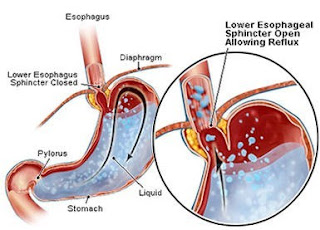Many of us suffer from gastroesophageal reflux, or acid reflux, but GERD is a more serious form of gastroesophageal reflux and is the acronym for gastroesophageal reflux disease. It occurs when stomach contents rise up into the esophagus (the tube that carries food from the mouth to stomach). When refluxed stomach acid touches the lining of the esophagus it may cause a burning sensation in the chest or throat; this is called heartburn or acid indigestion. Occasional gastroesophageal reflux is common, however, if it occurs more than twice a week, a physician should be consulted, as it may be GERD.
Main symptoms of GERD include frequent heartburn and acid indigestion. Some people with GERD do not experience heartburn but may have a dry cough, asthma symptoms, or trouble swallowing. Foods that may worsen reflux include:

- Citrus fruits
- Chocolate
- Caffeine or alcohol
- High fat and fried foods
- Garlic and onions
- Mint flavorings
- Spicy foods
- Tomato-based foods e.g. spaghetti sauce, salsa, chili, pizza
Treatment for GERD may involve the use of antacids, over the counter medications, and changes in diet. Medications called proton pump inhibitors may be prescribed if symptoms occur more than three times a week or if they cannot be controlled by over-the-counter therapy and lifestyle alterations. If you experience difficulty in swallowing or frequent discomfort due to reflux, consult your physician or dietitian for assistance.
Information Sources:
http://digestive.niddk.nih.gov/ddiseases/pubs/gerd/
http://www.pennutrition.com.ezproxy.library.ubc.ca/KnowledgePathway.aspx?kpid=1707&trcatid=43&trid=1919


No comments:
Post a Comment